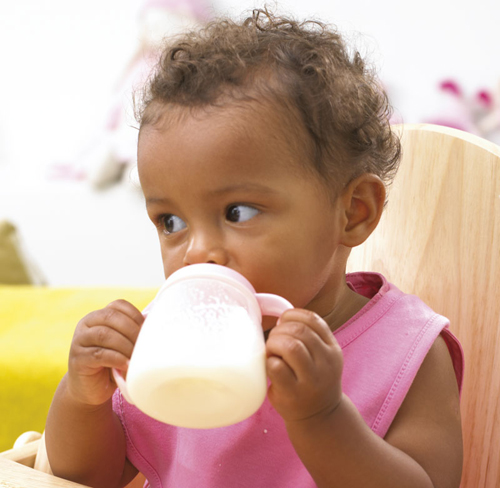Weaning is often a tricky and emotive period for toddlers and parents alike, because regular milk feeds are replaced with wholesome, nutritious meals. Don’t rush the process if you aren’t ready. As long as milk isn’t forming the main part of your toddler’s diet, you can continue to enjoy those comforting moments.
| Q: |
Is it OK to continue to breastfeed even when my toddler is eating a varied diet?
| | A: |
There is absolutely no reason why you can’t continue to
breastfeed as long as both you and your toddler are enjoying it. There
is plenty of research to suggest that breast milk continues to offer
antibodies well into toddlerhood, which can help build up your little
one’s resistance to infection.
Breast milk also
contains a whole host of vitamins and minerals. It is important, though,
that your baby has a healthy balance between breastfeeding and solids.
The majority of nutrients at this age should come from food, and not
breast milk. Filling up on breast milk can lead to reduced food intake,
which may lead to vitamin deficiencies.
Most
importantly, perhaps, is that breastfeeding offers emotional nourishment
and comfort to your child, and helps to build a healthy mother-child
relationship.
|
| Q: |
My toddler shows no desire to stop breastfeeding, but it’s starting to get embarrassing. What do you recommend?
| | A: |
If you are feeling pressured because you are breastfeeding past
the point at which many moms give up, try limiting it to morning and
evening feeds, when you can feed in private. If you are ready to give up
altogether, take it slowly. Start by losing one feed at a time and
offer a drink or snack in its place. It can take time, but weaning needs
to happen sometime .
|
| Q: |
Should I stop the nighttime bottle?
| | A: |
It is easy to fall into the habit of offering a night-time bottle
because it’s comforting. The longer this goes on, the harder it is to
stop, and drinking from a bottle at night can wreak havoc with
children’s teeth (see Should my toddler be drinking her milk from a cup?).
It’s a good idea to offer a cup instead. However, if you’re finding it
hard to get your toddler away from his bottle, gradually water down his
evening bottle over a few weeks, until it is virtually tasteless, and
encourage other comfort items, such as a favorite toy. SeeDid you know…, to ensure he gets his calcium requirements though.
|
| Q: |
My child doesn’t seem to like water. How can I make it more appealing?
| | A: |
If your toddler is used to sweet drinks and milk, water probably
does seem boring. Buy her a water bottle, perhaps with her favorite
character on it, and keep it filled throughout the day, so she gets into
the habit of drinking whenever she is thirsty. Sometimes offering water
with some ice cubes and a straw can make it more fun, too. If this
doesn’t work, try adding a tiny bit of juice and then reducing the
flavoring little by little until she’s drinking water alone.
|
| Q: |
Does it matter if my child won’t drink any milk?
| | A: |
Lots of children can’t or won’t drink milk, and grow and develop
perfectly well. The most important element of milk is calcium, which is
required for healthy bones and teeth. Calcium is found in all dairy
products, so if he’s eating yogurt, fromage frais, and cheese, he’s
probably getting enough. Leafy-green vegetables are also a good source
of calcium, and use milk when you can in cooking: in rice pudding,
creamy or cheese sauces, or even mashed potatoes or other root
vegetables.
|
| Q: |
Should my toddler be drinking her milk from a cup?
| | A: |
It’s a good idea to wean your baby on to a cup by the age of 6–12
months, when the sucking reflex is replaced by an ability to sip and
swallow. A cup is less damaging to her teeth because the sucking action
when drinking from a bottle causes milk to “swirl” around the mouth,
bathing the teeth in the natural sugars that it contains. A cup will
also limit her association of milk with comfort, which can sometimes
lead to problems with comfort eating and weight problems later on—and
also difficulties settling without a bottle. Start by switching the teat
on her bottle to a “spout,” so that she becomes used to drinking rather
than sucking. Then buy a few brightly colored cups with lids and ask
her to choose the one she’d like to have her milk or water in. If she
feels that she has some power to choose, the disappointment of not
having a bottle will soon be forgotten.
|
Did you know…
that children over the age
of one should get about 20fl oz (570ml) of milk a day? Remember, though,
that this is to provide the total amount of calcium required, so if
your toddler has a yogurt or two, some cheese, and milk on her cereal,
she’ll need correspondingly less. In fact, a glass of milk a day, plus a
yogurt and a small piece of cheese is actually just about right for
most toddlers, even though it’s tempting to offer more than this.

|